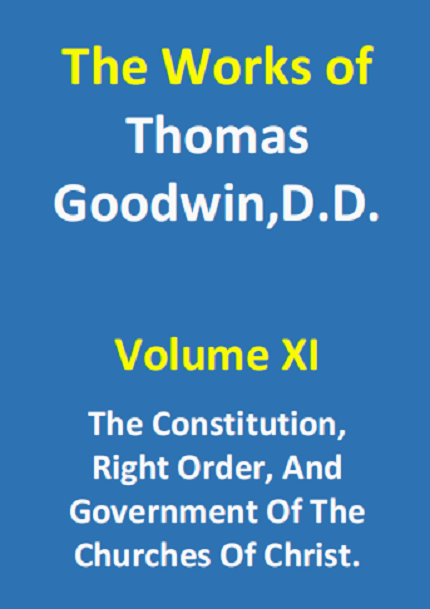By Thomas Goodwin, D.D.

The Works of Thomas Goodwin, D.D.
Volume 11: The Constitution, Right Order and Government of the Churches of Christ.
By Thomas Goodwin, D.D.
CONTENTS THE GOVERNMENT OF THE CHURCHES OF CHRIST:
Book I.
—Of the right institution of the churches of Christ.
— That the order and government of those churches are established by divine institution.
—What is the nature of divine institutions, and how the knowledge of them is conveyed to us; that Christ hath settled ordinances for worship and discipline, which are to continue unto the end of the world; that the power of church censures and excommunication hath its institution in a more especial manner from Christ, as head of the church
Book II.
—Of the divine institution of a congregational church.
—That it is not secondary, or consequent upon a charter given to the church universal, as virtually included therein, but is immediate and proper to it.
—That Christ instituted such a church in Matthew 18 and gave the power of the keys to it.
—That such congregational churches were primitive and apostolical, proved from the instances of churches planted by the apostles.
—That the constitution and order of such churches, is most fitly suited for the edification of the saints, and most exactly accommodated to their various conditions.
—That Christ hath not only instituted a congregational church, but hath appointed what the extent and limits of it should be
Book III.
—Particular congregations, having a sufficient number of elders and officers, are completely enabled for all acts of government, and excommunication itself, within themselves, aswell as for worship
Book IV.
—The claims of the Presbyterian government considered and refuted.
—That the church universal is not a church political, and the seat of government.
—That the institution for worship and government falleth not upon the saints in a nation, as a nation or kingdom, to be the seat of it.
—That an argument cannot be urged for a national church government, from the instance of the Jewish pattern.
—That a standing presbytery is not to be set up to exercise power and jurisdiction over particular congregations
Book V.
—The jurisdiction of synods debated.
—That appeals are not necessary to the government of the churches, and therefore there is no necessity of synods upon that account.
—What power may be allowed to a synod occasionally meeting to consider the maladministration of any particular church.
—That they have not that grand prerogative of power given by Christ to excommunicate other churches, and so by that rod to enforce them to revoke their sentence of maladministration, and to receive a person wrongfully excommunicated by them.
—The subordination of synods considered and refuted.
—Though particular churches are not subject to the jurisdiction of synods, yet they are not wholly independent, but there is a communion which they ought to hold one with another
Book VI.
—Of the constitution of a particular congregational church.
—The rise, institution, and definition of it.
—A comparison between it and the church universal.
—That Christ hath given to his saints a right and liberty of gathering into such holy societies.
— That in doing so they are not guilty of sinful separation or schism.
—Of the divers kind of officers in a church.
—That there is an institution for each sort.
—That the pastor and teacher are equal in authority and power.
—Of the exercise of the communion of saints, which the members of a church ought to have, one with another
Book VII.
—That the preaching of the gospel is an ordinance of Jesus Christ, instituted for the conversion of sinners, and for the edification of the saints.
—Of the use and necessity of ministers wholly set apart to preach.
—That Christ by his institution hath appointed a due maintenance for ministers.
—Concerning the time for the administration of ordinances, and whether the sacrament of the Lord’s supper ought to be administered on every Lord’s day.
—Whether, in case of necessity, a church may by common consent divide themselves, to meet in several parts, and receive the Lord’s supper in such distinct meetings, rather than omit that ordinance wholly.
—Whether in case of apparent danger of life, loss of estate rationally foreseen, or in case of force and violence, causing ordinances to cease, there may not be prudent forbearance or secret avoidance.
—Whether one who is not a church member may be the subject of baptism.
—Whether one who is not a pastor may administer baptism.
—Whether a church may depose an officer for a fault, which doth not deserve excommunication.
—Of anointing with oil.
—Of toleration and liberty of conscience to be granted to particular churches, though differing from the national constitution
THE GOVERNMENT AND DISCIPLINE OF THE CHURCHES OF CHRIST, SET DOWN BY WAY OF QUESTIONS AND ANSWERS
TWO LETTERS CONCERNING A CHURCH COVENANT
TWO LETTERS CONCERNING CHURCH GOVERNMENT
Looking for a Hardcover or Paperback?
For those who want to have a hardcover or a paperback of this book, I want to suggest you to look here. For the complete works of Thomas Goodwin, look here.